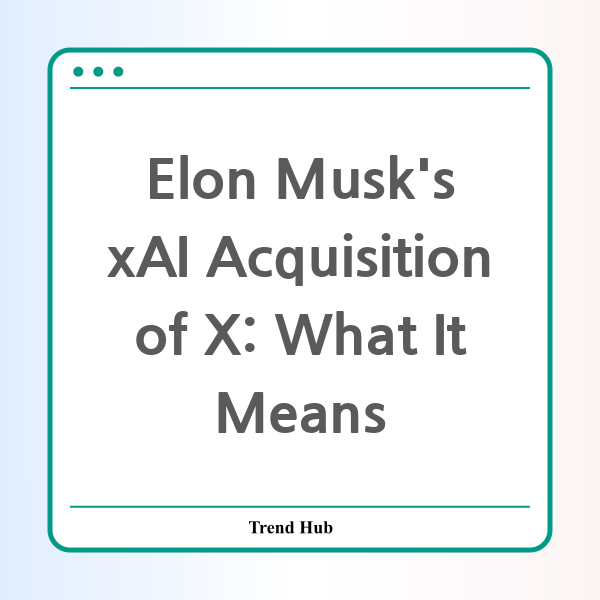* This website participates in the Amazon Affiliate Program and earns from qualifying purchases.

Has Elon Musk just changed the landscape of social media and artificial intelligence forever? This question hangs in the air amidst the recent announcement that Musk's AI venture, xAI, has officially acquired the social media platform X, previously known as Twitter. This strategic move has sparked intrigue and debate across industries, raising significant questions about the intersection of AI and social media.
Musk revealed that the deal, valued at around $33 billion to $45 billion in different accounts, marks a pivotal moment in how X leverages artificial intelligence to enhance user experiences. Musk emphasized that "xAI and X’s futures are intertwined," suggesting that this merger promises to unleash a powerhouse of data and technological capabilities.
Since taking X private in 2022, Musk has been keen on redefining the platform's purpose and utility. By integrating xAI’s Grok chatbot—an AI-powered tool intended to provide factual, unbiased responses—into X, Musk aims to create a more engaging and meaningful user experience. His vision is clear: to develop a platform that not only reflects societal dynamics but also accelerates human progress through knowledge and truth-seeking.
This acquisition is especially significant given the broader context of AI's explosive growth. With xAI recently raising $6 billion from major investors, including Blackrock and Fidelity, the company is positioned to push its sophisticated AI models into the mainstream quickly. Musk's strategic foresight—the result of his previous ventures—has fueled optimism among investors, with speculations that the combined entity could be valued as high as $80 billion.
Notably, this acquisition comes at a time when X has seen a recovery in its advertising relationships, after previously facing backlash for issues related to hate speech and misinformation. As advertisers return, Musk's influence—bolstered by his ties to political sentiments—may serve to boost X’s profitability and sustainability.
The competition in the AI sector is heating up, and Musk's xAI plans to capitalize on its advanced infrastructure, including the Colossus supercomputer in Memphis, which is claimed to be one of the largest in the world. This could allow for more sophisticated AI training and the development of cutting-edge applications that could integrate seamlessly into X.
Moreover, the integration of Grok into the social media platform is already stirring dialogue among users. The chatbot aims to provide a counter-narrative to the so-called "woke" ideologies, positioning itself as a tool for "truth-seeking." Musk's framing of Grok may attract users who feel alienated by mainstream narratives, further driving engagement on the platform.
As we observe how this merger unfolds, several questions remain pertinent. Will xAI’s technological prowess lead to innovative features that enhance user retention? Can X successfully navigate the complex landscape of social media ethics while incorporating advanced AI? The answer to these questions might shape the future of social media as we know it.
In conclusion, Elon Musk's acquisition of X by xAI signifies more than just a financial transaction; it represents a bold vision for the integration of AI within social media platforms. As Musk embarks on this new venture, the potential implications for technology and society are profound and warrant close observation.
* This website participates in the Amazon Affiliate Program and earns from qualifying purchases.